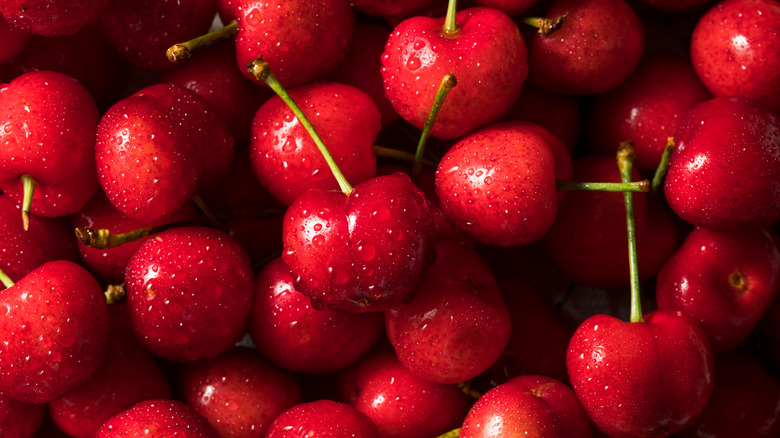The Surprising Reason You May Want To Avoid Cherries On Valentine's Day
The cherry is widely regarded as a sexy fruit, if not the sexiest of all fruits, per Sex-lexis. Even the word itself is sexy, associated as it is with the notion of virginity and desirability. Crimson-hued, shiny, and glistening wet, what does the cherry bring to mind if not shiny lips, flushed skin, and hot blood? Heart-shaped and rounded, with a subtle cleft down the center, a single cherry can be said to resemble a particularly perky backside, or perhaps a pair of lips, or a woman's heaving bosom. Or perhaps all of the above. Dripping with red juices, the cherry's soft flesh tastes sweet with a hint of darkness. Even tying a knot in a cherry stem can make you look sexy, as long as you do it with just your tongue. And according to some medical professionals, eating cherries can even support a healthy sex drive (via IVFMD).
But you know how they say that in romance, timing is everything? Well, that's especially true when it comes to eating cherries. As a matter of fact, you might want to consider avoiding cherries altogether at times when you're planning on getting romantic. Like, Valentine's Day, for example. We know, it seems counterintuitive. If ever there were a holiday on which cherries would seem utterly appropriate, it would have to be Valentine's Day. Here's why you might want to rethink that.
Cherries are actually the opposite of arousing
You'd think cherries would be an obvious choice for Valentine's Day. Just look at sexy-looking brandied cherries or sweet little cherry pies, for example. In fact, cherries are rich in nutrients that support a healthy sex drive (via IVFMD). The issue isn't whether cherries are a healthy indulgence, however. The issue is when you choose to indulge, according to a number of studies that suggest that as sexy as cherries may seem, rather than arouse, they are more likely to make you drowsy.
The surprising reason is that cherries are rich in a substance called melatonin, which is a "circadian hormone produced at night by the pineal gland," according to the authors of a 2019 study published in Journal of Food Science. According to the study, consuming sour cherries may improve sleep quality in humans, especially when consumed with milk products (think: ice cream, whipped cream). This would appear to concur with the results of a 2012 study published in the European Journal of Nutrition (posted at the National Library of Medicine), in which consuming tart cherry juice concentrate before bed was associated with improved sleep quality. In addition, the 2012 study suggested that drinking tart cherry juice may help people fall asleep faster.
Falling asleep faster would not appear to bode well for a night of romance. So, if you're hoping romance will be on the menu for Valentine's Day, you may wish to consider skipping the cherries (not to mention the oysters).

